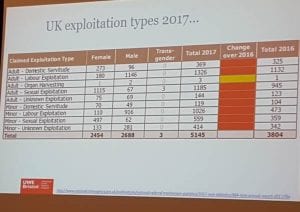Reflections on human trafficking lecture by students from Backwell and Badminton Schools
Geographical perspectives on human trafficking, smuggling and security.
Report by Lizzie Knowles and Jemima Rogers, Backwell School
On Tuesday 16th October 2018, a second GA autumn series lecture for sixth form students was held at the Peel Lecture Theatre, University of Bristol. The lecture was delivered by Jason Snelling (from UWE) on the topic of human trafficking and smuggling.
Jason provided an alternative perspective on human trafficking and smuggling. It was interesting to learn of the distinction between human trafficking and human smuggling. Human smuggling refers to the practice of facilitating the illegal entrance of a person into a different country, of which they are not a national. We learnt that this does not usually happen against their will. In contrast, human trafficking describes the act of a person moving someone (over any distance, often within one country) for the purpose of exploitation. There are many forms of human trafficking but we found it thought-provoking that many victims of human trafficking go willingly, with the promise of a better quality of life, but are later exploited.

The issue of human trafficking has links to other aspects of geography. Regarding climate change, people are forced to leave their homes due to ramifications from the changing climate. This makes them vulnerable to human trafficking. Globalisation has facilitated trafficking through the use of technology to make organised crime less detectable and more efficient.
We found these links to be relevant to our A-Level Geography course as it demonstrated the human costs of failing to address environmental and political issues.
There were a number of intriguing questions asked by members of the audience. Some of these included the impacts of Brexit on human trafficking in the European Economic Area. It was interesting but worrying to hear that the technological advances of the trafficking industry may make it almost impossible to prevent it in the future.
The lecture addressed the trafficking industry on a range of scales, from global to local. This made us think about how the issue affects our own city and local area.
Overall, the lecture was successful and gave an insightful view into an often-hidden issue.
Report by Nathalie, Phoebe, Nicole and Isla from Badminton School
Last week we attended a lecture organised by the Bristol branch of the Geographical Association: ‘Geographical Perspectives in Human Trafficking’. Jason Snelling from the University of the West of England gave the lecture. It was particularly interesting to hear him speak as he had knowledge of the subject beyond academia. His research findings gave real rooting to the talk and allowed us to appreciate how widespread this problem is.
The lecture began with a definition of human trafficking, as many people confuse it with human smuggling. Human trafficking is “…a person having control over another person, for the purpose of exploitation” as defined by the UN Office on Drugs and Crime. Human smuggling, on the other hand, is defined as “…illegal entry of a person into a State Party of which the person is not a national or a permanent resident.” The fact that many of the students present, including us, did not know the difference showed how unaware many people are of these problems. Another theme of the lecture was the interconnected nature of human trafficking with other geographical issues and forms of crime. We learnt that there is a nexus (interconnection) between human trafficking and climate change, as well as migration and human trafficking and crime and human trafficking. The links between these geographical matters fascinated us.
The lecture reminded us that although human trafficking is an extremely important problem, it is often hidden. It is only when you look for victims of human trafficking that you are able to find them. The lecture highlighted that although the figures for victims of human trafficking are awful, we are highly likely to underestimate the problem. For example, in 2016 there were only 24 adults referred as victims of human trafficking by the local police service. However, the London Metropolitan police service referred 111 adults in the same period. These statistics do not necessarily mean that there is little human trafficking in the region covered by the Avon and Somerset Police. The Metropolitan police service has a proactive team dedicated to addressing human trafficking whereas in Bristol human trafficking is dealt with in a responsive manner. As a result, the Metropolitan police service identifies more victims than the Bristol police service; the figures are unlikely to show the true extent of human trafficking in the Bristol area.
Another link between the Schengen zone in the EU and increased human trafficking was also interesting, as we had not thought about the possible negative implications of Schengen. The talk concluded with a mention of the impact of Brexit on human trafficking in the UK which we found gripping.
Many thanks both to Jason for such a thought-provoking talk and to the Bristol branch of the GA for organising this. We look forward to the next lecture!

